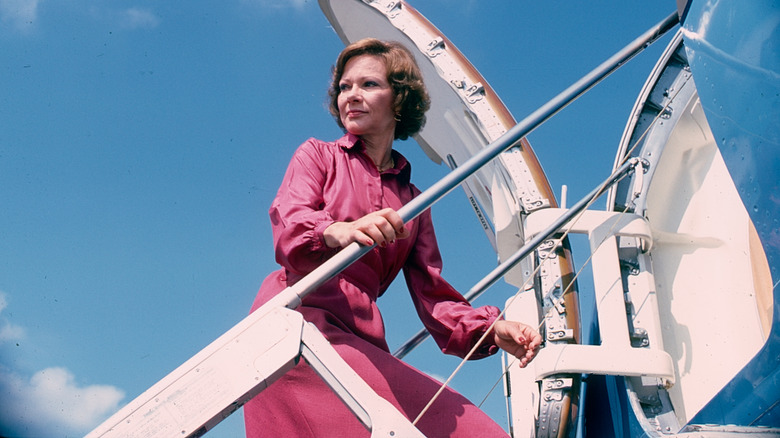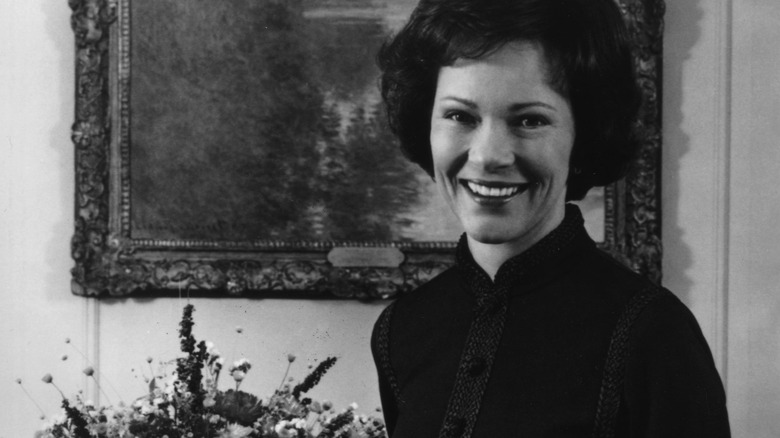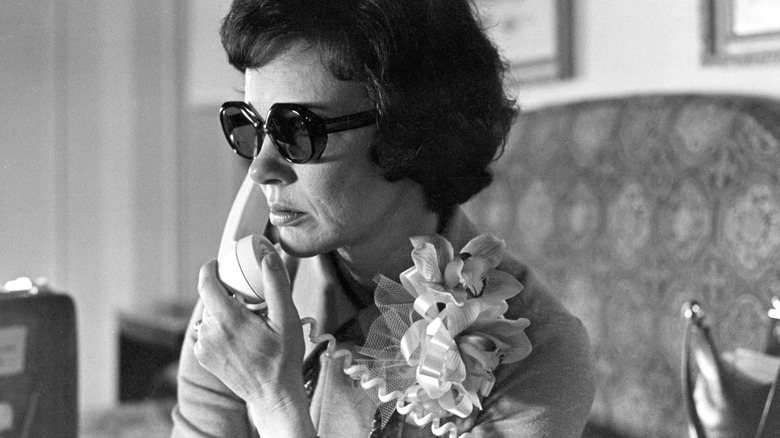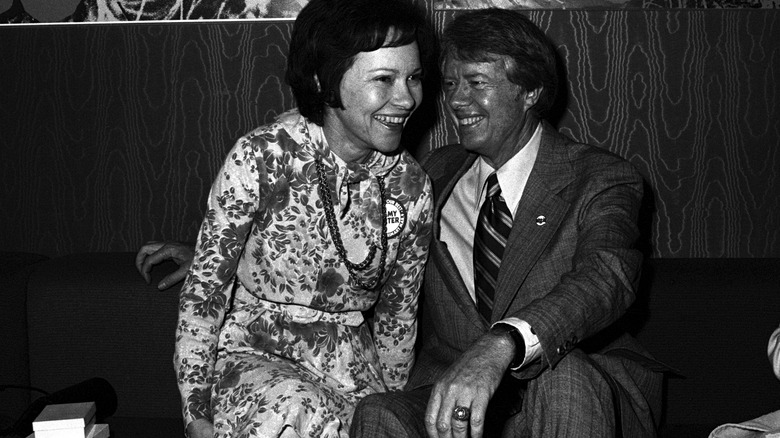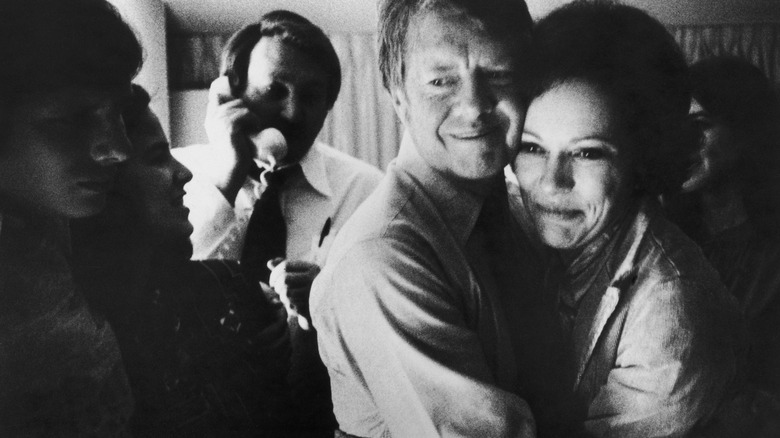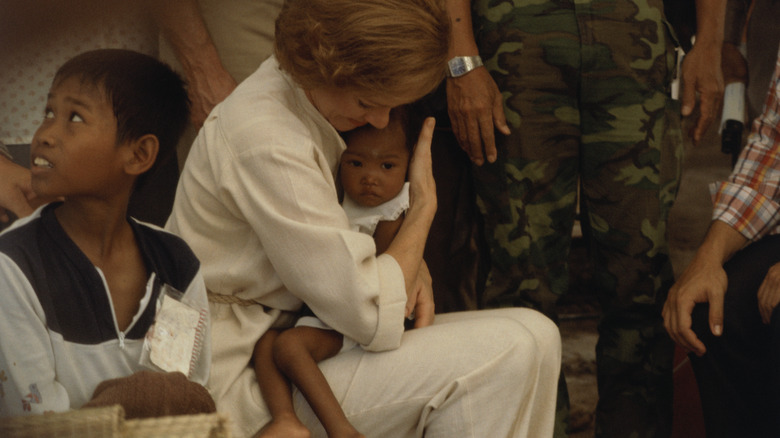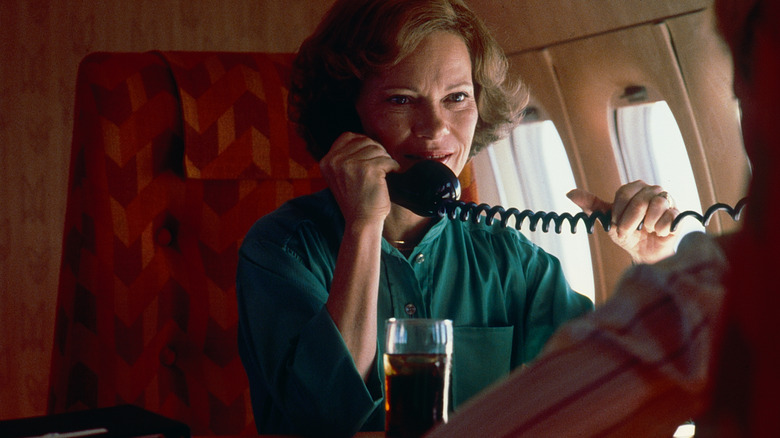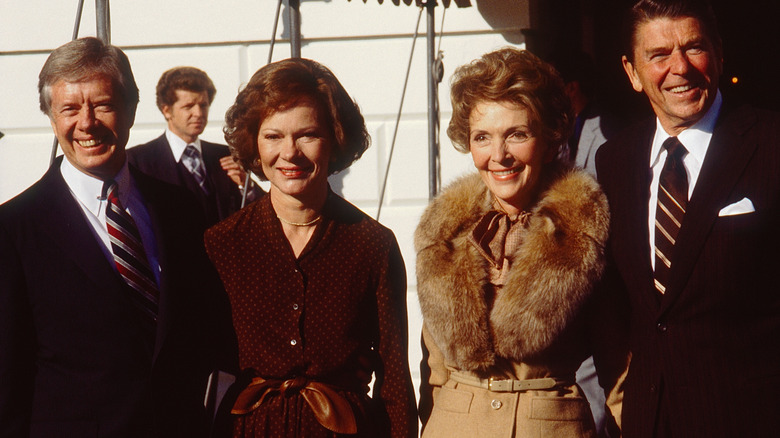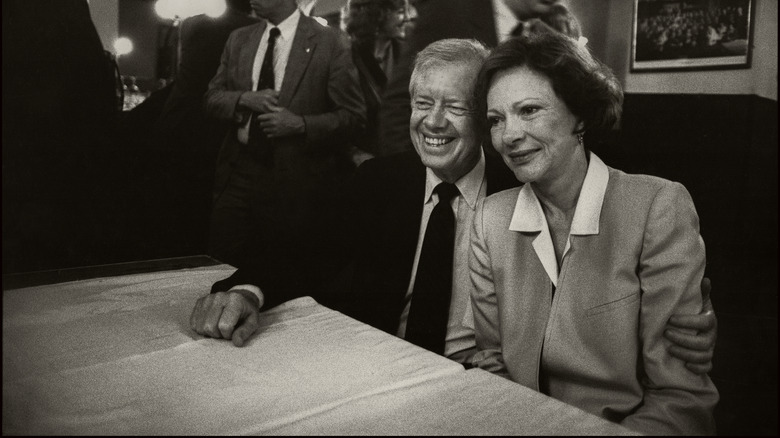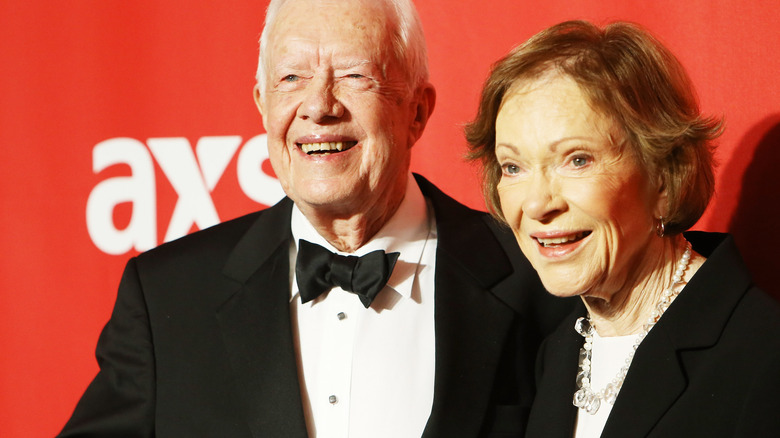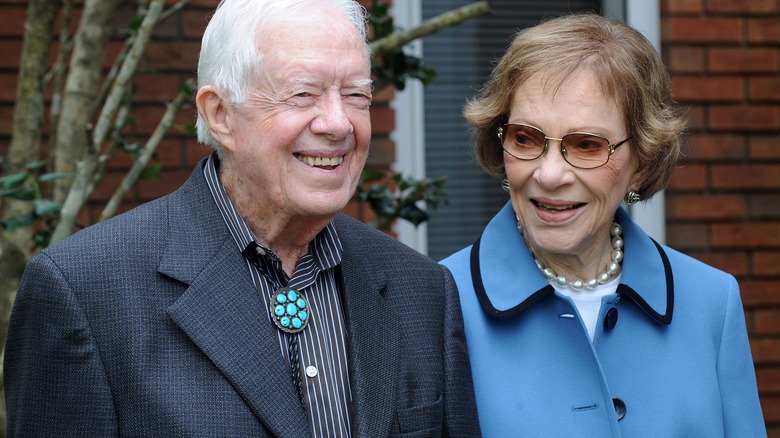Tragic Details About Rosalynn Carter, Former First Lady Of The United States
In recent decades, the First Ladies of the United States have used their positions to raise awareness to causes not only near and dear to them, but to millions of Americans. Michelle Obama in particular was never content to sit back and play hostess: She encouraged children to get healthier, championed education, and raised awareness about the problems with school lunches. She made history, and in 2023, she posted a loving tribute to another former First Lady who wasn't content just to be a pretty face in a dress: Rosalynn Carter.
"Her life is a reminder that no matter who we are, our legacies are best measured not in awards or accolades, but in the lives we touch," Obama wrote in a post on X. She lauded Carter for her contributions not only to advancing women's rights and demonstrating the impact that a politically and socially active First Lady could have, but also her dedication to fighting the stigma surrounding mental health, improving care available to the elderly, and her — and her husband's — commitment to affordable housing and work with Habitat for Humanity.
When Carter passed away in 2023 at the age of 96, coverage of her death included not only acknowledgment of her achievements, but a look back at a lifetime that revolved around her decades-long marriage to Jimmy Carter. It's the stuff that even the most steadfast romantic can only aspire to, but that's not to say that her life was free of tragedy, hardships, and difficulties.
She was taught to hide her emotions
By the time she and her husband moved into the White House, the press had dubbed Rosalynn Carter "the Steel Magnolia" for her strength and her kindness. She approved, saying (via CNN) "Steel is tough and magnolia is southern." She'd had to develop that tough exterior early, and she was candid, too, about how the heavy-handed punishments she was subjected to as a child left her carrying the weight of emotions in a very private way.
In her memoir, "First Lady from Plains," she wrote that while she and her siblings were pretty well-behaved most of the time, she had often gotten spanked for crossing the street even though she was told repeatedly that she was too young and the street was too dangerous. "My father always spanked me for this, and afterward he would tell me not to cry. And I wouldn't. But later I would go to the outdoor privy and cry and cry there all alone," she wrote. She recalled her mother crying, too, unable to watch the punishments being handed out.
"I don't know why my father wouldn't let me cry," Carter wrote. "I thought it was very unfair... often I would think that he was mean and imagine that he didn't love me. Just having these thoughts troubled me and gave me a guilty conscience for years." That, she continued, turned into an unbearable weight and constant pressure to do good, be good, and achieve. When inevitable slip-ups happened, it devastated her.
A summer of independence ended with the death of her father
For Rosalynn Carter, the promise of teenage summers were quickly overshadowed by a family death that would change her life forever. In her memoir, "First Lady from Plains," she wrote that she had been over the moon with her mother's offer to send her to the summer camp she'd been begging to attend. When she got home, though, she learned that she had been sent away so her father could undergo a series of tests to try to determine why he'd gotten so sick.
She wrote, "... we knew something was very wrong. He's always been a strong man who worked on automobiles, who could do anything, but now he wasn't even going to work every day. ... I began to worry. And I began to pray."
Thirteen years old at the time, she wrote that she not only dreaded seeing him getting sicker and sicker, but she had convinced herself that she was at least partially to blame. "I thought he was suffering because of the mean thoughts I'd had about him in the past, that somehow I was part of the cause of his illness. ... I didn't dare tell anyone how I felt. Especially my mother. I didn't want to add to her hurt." When her father passed away not long after being diagnosed with leukemia, Carter wrote that her role in the family changed: Now, her mother depended on her not as a daughter, but as a responsible adult.
Her introduction to the dark side of politics was terrifying
Jimmy Carter called (via The Washington Post) the first time he ran for office in 1962 "a startling education in politics." Rosalynn Carter wrote in her memoir, "First Lady from Plains," about the election where her husband discovered just how deep into the ballot boxes a man named Joe Hurst was. She described him as the "Quitman County ... boss," and said that when it came time to challenge the results, Jimmy didn't quit.
"There were threats on his life, and one day in the peanut warehouse, one of our customers told me that the last time anyone had crossed Joe Hurst, his businesses had burned down. I was scared all the time," she wrote. Ultimately — and after an investigation turned up evidence of election tampering — Jimmy Carter was declared the winner, but the hardships didn't stop for Rosalynn.
She wrote that not only was she "totally disillusioned with the whole political process," but that the following weeks were spent in fear. Alone with their children while Jimmy headed off to Atlanta, she wrote that she received a message from Hurst that reminded her that the last people who had stood up to them had suffered massive, life-changing fires. "It was not an idle threat," she wrote. She nailed windows shut, and every day, she would search their home to make sure no one was hiding in wait. Long and sleepless nights were spent, waiting and watching, with barricaded doors and burning lights on.
She considered divorce when a family death turned their lives upside-down
In Stanly E. Godbold's biography "Jimmy and Rosalynn Carter: The Georgia Years, 1924-1974," he revealed how close Jimmy and Rosalynn Carter came to divorce. Jimmy's father, Earl, passed away in 1953 when Jimmy was in the Navy and Rosalynn was happy being a military wife. But Earl's death left the rest of the family without a guiding presence, and the family farm without a patriarch. That led to his resignation from the Navy on grounds of familial hardship, and he did it without asking Rosalynn what she wanted.
She had thought they left their small hometown behind, and after only seven years, it loomed in her future like an unavoidable behemoth. At the same time he was given his honorable discharge, she was considering divorce: She felt she had no opinion in the matter, but what she did have was three young children who needed to be looked after. So, she stayed with him, and they returned to the place they'd grown up in.
Rosalynn suddenly found herself under the watchful eye of the elder women, including Jimmy's mother, Lillian, and her own mother. She also found herself being pressured to join his church — Baptist, instead of the Methodist faith she'd grown up in — and it wasn't until they rented their own home — complete with secret rooms and ghost stories — that she started to come to terms with the fact that she was back... even if she didn't want to be.
One of the hardest things she had to do as First Lady was visit the suffering left behind by Pol Pot
On a personal level, it was Rosalynn Carter's 1979 trip to Thailand that was among the hardest things she'd ever been faced with. When The New York Times covered her trip, they quoted her as saying, "It's like nothing I've ever seen," and when she wrote about it in her memoir, "First Lady from Plains," she shared how devastating it had been.
Cambodians fled Pol Pot ahead of violence and starvation, and she said that everyone in the camp was dying, mourning, or both. She wrote of walking through the camp and seeing scores of people who couldn't even acknowledge their surroundings: "All were ill and in various stages of starvation — some all bones and no flesh, others with stomachs swollen as though to burst and with cracked feet. All had malaria, dysentery, or tuberculosis, and were retching, feverish, silent."
The worst, she said, was the tent that had been set up for the hundreds of children "with emaciated bodies and limbs so thin and fragile, and they were eerily quiet. There [was] not even any crying, only an occasional whimper." She shared that she had picked up a little girl, cradling her in her arms and wondering what the future held for her. Tearing up, she put the girl down and continued on her way, but learned that the child's future was very short indeed: She died before Carter left the camp that day.
She condemned not being taken seriously because of being a woman
Elizabeth Flowers, a professor of religion at Texas Christian University, said that when it came time to chalk up the wins and assess the failures, Rosalynn Carter was most disappointed in the failure of the Equal Rights Amendment. Flowers wrote that Carter was wholeheartedly invested in getting the amendment to pass, and when it fell just three states short even after the extension of the deadline, it devastated her.
Carter was very outspoken about the challenges she faced as a woman trying to get things accomplished, and in 1979, she was the guest speaker at the Matrix Awards Luncheon of New York Women in Communications Inc. At the time, there were more and more women present in government, but there needed to be more — and they needed to pass the Equal Rights Amendment because it was going to have a domino effect that would impact other causes, too.
For starters, the causes that she championed throughout her time as First Lady and beyond, including care for the elderly and improvements to the mental health care system. The problem? She said (via The New York Times) that she didn't get the coverage she wanted, because they weren't "sexy" enough causes. "The media is not very interested, and I cannot tell you how much these negative attitudes bother me," she said. "We need all the attention we can get for these, our most vulnerable people."
She took Jimmy Carter's loss to Reagan very, very hard
When Jimmy Carter ran for reelection in 1980, he lost in a shocking landslide. Rosalynn Carter wrote about how difficult it was, and in her memoir, "First Lady from Plains," she wrote that not only was it hard seeing the disappointment in all the people who had worked so hard in campaigning for them, "...but the one I hurt for most was Jimmy. The difficult concept to bear was his rejection by the American people, for whom he'd worked so hard and for whom he cared so much."
The time between the election and Reagan's inauguration was particularly difficult, she recalled: While he still needed to perform the duties of the president, she was left to fill her days with wondering what they could have done differently. She saw her daughter in particular struggling: After having to pick up and move once, she was once again having to deal with leaving behind everything familiar.
"I felt very melancholy as I wandered around the rooms that had become so familiar to us," she wrote. "... That day I was trying to detach myself from a life that would soon be over, one I had thought I would enjoy for four more years." She was candid, too, about the fact that she wanted him to run for office again. By 1984, that hadn't changed: She told UPI that Reagan's time in office was a "tragedy... The gap between the rich and the poor... the horrible mess he has made of foreign policy."
She hated watching what became of the Mental Health Systems Act of 1980
One of the causes that was closest to Rosalynn Carter's heart was reforming the way the country dealt with mental health. She wrote that it truly started with one woman, who shared with Carter the story of her mentally ill daughter, and the fact that she and her husband worked opposite shifts and then worked even longer hours at home, caring for her. Carter later wrote in one of her books (via the Associated Press), "The image of the woman haunted me all day."
Although she was lauded for her commitment to overcoming the stigma that was associated with mental health issues, her biographer, Jonathan Alter, wrote that one of the only times he ever saw her get truly upset was when talking about the Mental Health Systems Act of 1980. Alter wrote in The New York Times that when he spoke with her in 2015, she was still deeply upset by what had happened to the act that she had spearheaded alongside Edward Kennedy.
The act was meant to provide mental health care resources for those who needed them yet were in communities or areas that were underfunded and underserved, and when it passed through the House and the Senate, it gained even more traction and a wider scope, with provisions added to help those who were victims of sexual assault. It was extremely short-lived, though, ratified at the end of Carter's presidency and largely defunded by Reagan-era budget cuts.
Her grandson died, young and unexpectedly
Edna Langford was a longtime friend of Rosalynn Carter, as well as being a part of her extended family. Her book, "Rosalynn: Friend and First Lady," offered a uniquely intimate view of Carter's life in and out of the White House. One of the most devastating personal events that happened during Jimmy Carter's presidency was the split of Chip Carter and his wife, Caron. Langford wrote that it was such a traumatic event that "The whole thing was like a death in the family," and everyone — even the staff — took it hard.
Family came first and foremost for the Carters, and in 2015, they found themselves dealing with an even more devastating tragedy that came on the heels of what should have been cause for celebration. Just two weeks after Jimmy Carter announced that he had been declared cancer-free, he also announced that his 28-year-old grandson, Jeremy, had died suddenly and unexpectedly.
USA Today reported that he shared the tragic news ahead of the Sunday school class that he taught, saying that Jeremy simply hadn't felt well, so he decided to take a nap. "So he went to his room to lay on the bed and when they went to see if he was OK, and his heart quit beating," they quoted the former president as explaining. "So they tried to give him CPR, but he passed away. He was just 28 and a very wonderful young man who we loved very much."
Her death marked the end of a literal lifetime together
Jimmy and Rosalynn Carter have long been seen as relationship goals, no matter what anyone might think of his effectiveness as president. While it's true that they were teenage sweethearts, they had actually known each other much longer than that: The midwife who delivered Rosalynn was Lillian Carter, who brought her son to meet the newborn just days after she was born. At the time of her death in 2023, they had been married for 77 years. The Carter Center released a statement from 99-year-old Jimmy:
"Rosalynn was my equal partner in everything I ever accomplished. She gave me wise guidance and encouragement when I needed it. As long as Rosalynn was in the world, I always knew somebody loved and supported me."
The Washington Post did a retrospective of their final years together, saying that even as they both crept into their 90s, they were caretakers for each other. He nursed her through major surgery in 2018, she nursed him through his cancer diagnosis, and those who knew them best said they had spent their last days together at home — largely unchanged from the 1960s — watching television and sitting close enough together that they could hold hands. Family friend Jill Stuckey said, "It's hard to imagine one without the other."
